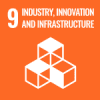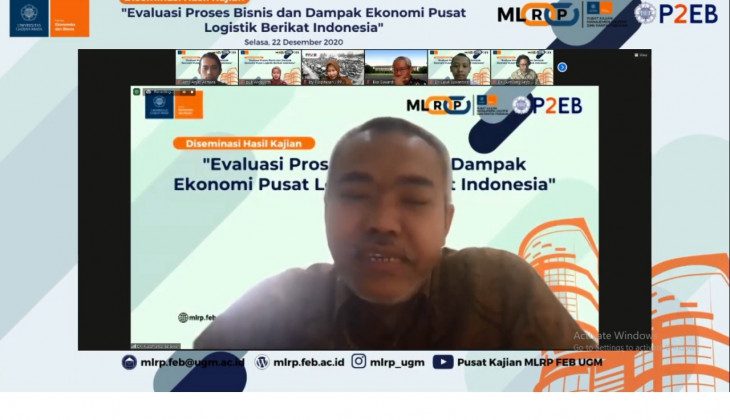Logistics and Supply Chain Management (MLRP) plays a vital role in driving the Indonesian economy. The Indonesian Government built a Bonded Logistics Center (PLB) in 2016 to improve national logistics efficiency. Besides, it is expected that PLB’s establishment can encourage domestic investment and make Indonesia an Asia Pacific hub. Since it had been officially established, PLB has remained to grow, and currently, there are 128 PLBs in total throughout Indonesia.
PLB also initiated an organization that later formally became the Association of Indonesian Bonded Logistics Centers (PPLBI) with 54 PLB members. Establishing PPLBI is a forum for communication and liaison between PLB operators and other industrial partners.
Discerning the critical role of PLB, the research team from the Faculty of Economic and Business (FEB) UGM conducted a study entitled “Evaluation of Business Processes and Economic Impacts of the Indonesian Bonded Logistics Center”. The team led by Kusdhianto Setiawan, Ph.D., with Luluk Lusiantoro, Ph.D., and Gumilang Aryo Sahadewo, Ph.D., collaborated with PPLBI to conduct this research.
There are two main objectives as the background of why the research was conducted. First, they evaluate the PLB business process’s effectiveness and, secondly, evaluate PLB’s performance and contribution to the economy. This study results were exhibited in the Study Results Dissemination Webinar organized by the Center for Logistics and Supply Chain Management (MLRP) FEB UGM on Tuesday (22/12). There were also public and various stakeholders invited to the PLB program to join through the Zoom platform and the Youtube channel of the FEB UGM MLRP Study Center.
Kusdhianto explained that the PLB program had already been on the right track and positively impacted the Indonesian economy to rouse his presentation. His result research reaffirmed the role of PLB as an alternative logistics management that is transparent, free from coercion, and is undeviatingly integrated with customs.
“PLB provides great benefits, such as the suspension of import duties for up to 3 years, which provides partial flexibility in releasing goods. This benefit can help users’ cash flow, significantly reduce dwelling time, and settle excise activities more efficiently. Besides, the implementation of a comprehensive electronic surveillance system from PLB also develops security, supervision, and control of in-and-out assets,” explained the lecturer of MM FEB UGM.
Also, Kusdhianto said that PLB had been certified to encourage industrial performance in Indonesia. According to him, the existence of PLB facilitates access to raw materials and supporting materials from abroad, reduces logistics costs, and increases the production and industrial competitiveness of PLB users’ clients. “Not only large companies and national-foreign private companies who obtain the impact but small and medium enterprises in Indonesia also do,” he added.
Still, Kusdhianto also explained that the PLB business process also underwent several obstacles that PLB operators and users found, such as unsynchronized regulations between ministries. He revealed that a lack of socialization regarding regulations caused the ministry’s regulatory system to be unsynchronized. This socialization introduces new regulations that will be implemented and the past regulations that require the same review and perception.
Moreover, as a solution, Kusdhianto suggested that they make continuous improvements, especially in several essential aspects of PLB users, but their performance still needs improvement. These aspects are like the service aspect related to the ownership of goods in PLB and export facilities that can positively impact the national economy. Besides, he also mentioned that there should be an improvement in PLB regulations’ harmonization and socialization, especially to support Indonesia’s aspiration to become a logistics center in the Asia Pacific.
Ety Puspitasari, as the General-Head of PPLBI, expressed her appreciation to the FEB UGM research team for the research dissemination. She admitted that her party needed this research study because PLB has experienced many challenges and opportunities since it was established four years ago. Although PLB has also made some improvements, she thought that there had not been a comprehensive study such as this research results.
“I represent PLB throughout Indonesia to thank for today’s dissemination. This study has become an evaluation and reflection of four years since our institution was founded. Accordingly, I hope this study can enhance a basis for improvement for PPLBI and PLB as a whole in Indonesia,” she revealed.
Meanwhile, Eko Suwardi, M.Sc., Ph.D., as the Dean of FEB UGM, also expressed his gratitude to PPLBI for their trust in FEB UGM to conduct this study. He hopes that this study can benefit them and all other parties, both PPLBI, PLB throughout Indonesia, and the community.
“I hope this cooperation does not stop in this study. We still have other logistical-related resources, such as customs and bonded zone issues. Hence, we highly welcome if you are interested in collaborating on future studies with us,” Eko concluded.



